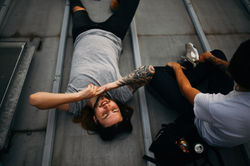Calmate, it's going to be okay.
 |  |  |
|---|---|---|
 |  |  |
DEALING WITH STRESS & ANXIETY
The effects of Stress & Anxiety include headaches, heartburn, tense muscles, rapid breathing, increased depression, insomnia, higher risk for heart attack, high blood sugar, high blood pressure, stomachache, low sex drive, missed period, fertility problems, erectile dysfunction, weakened immune system. The list is never ending. All effects that are harmful to us, our bodies, and mental health.
Two of a Three legged approach to dealing with Stress and Anxiety is one: Pharmaceuticals, and two: surgery and medical procedures. What if neither of those were ones you felt were approaches you wanted to try? What if I told you there was a simpler way? What if I told you Self-care is that third leg?
This is where Relaxation Response comes in. A way to turn off your "Flight-or-Fight" mode by simply applying self-care.

RELAXATION RESPONSE
Relaxation response is something that you can consciously use to alter your physical and emotional responses to stress and anxiety without medications.
DO IT YOURSELF
Steps to Relaxation Response
10 SIMPLE STEPS TO FOLLOW
1. Focus
Pick a focus word, short phrase, or prayer that is firmly rooted in your belief system.
2. Get Comfortable
Sit quietly in a comfortable position.
(I prefer to lay down flat on my bed. Remember, whatever makes you feel comfortable.)
3. Eliminate physical surrondings
Close your eyes and relax them.
4. Relax
Relax your muscles, progressing from your feet to your calves, thighs, abdomen, shoulders, head, and neck.
5. Breathe, Say, Exhale
Breathe slowly and naturally, and as you do, say your focus word, sound, phrase, or prayer silently to yourself as you exhale.
6. Return to Repetition
Assume a passive attitude. Don't worry about how well you're doing. When other thoughts come to mind, simply say to yourself, "Oh well," and gently return to your repetition.
7. Continue
Continue for 10 to 20 minutes.
8. Stay Calm
Do not stand immediately. Continue sitting quietly for a minute or so, allowing other thoughts to return. Then open your eyes and sit for another minute before rising.
9. Daily
Practice the technique once or twice daily. Good times to do so are before breakfast and before dinner.
10. Repeat
Regular elicitation of the relaxation response has been scientifically proven to be an effective treatment for a wide range of stress-related disorders. In fact, to the extent that any disease is caused or made worse by stress, the relaxation response can help.

"What would life be if we had no courage to attempt anything?"